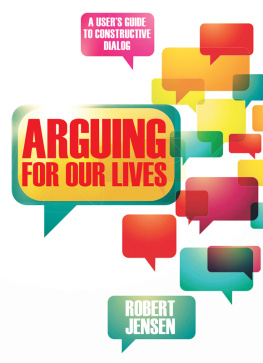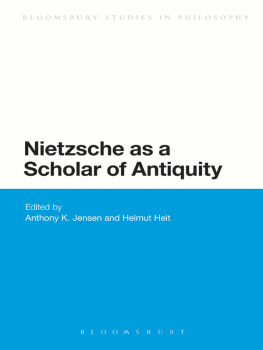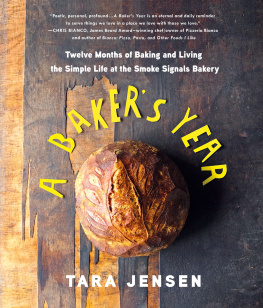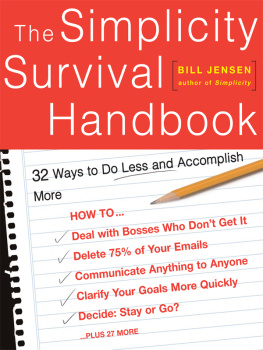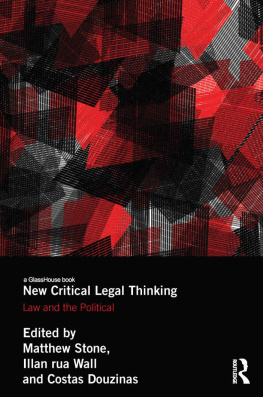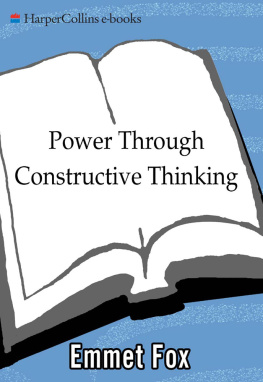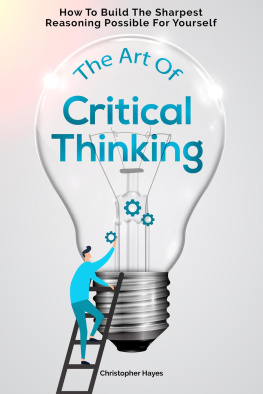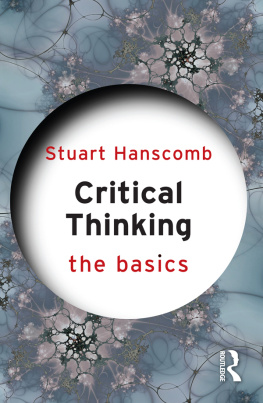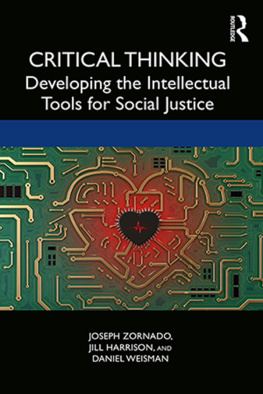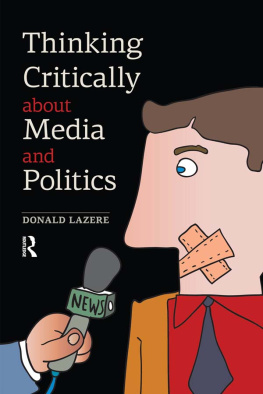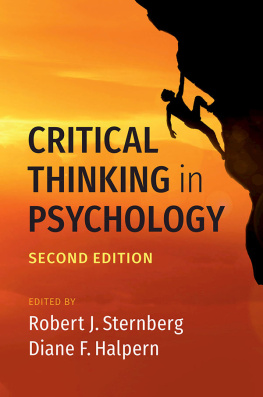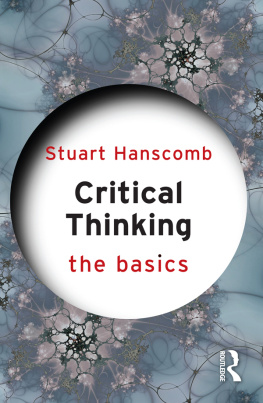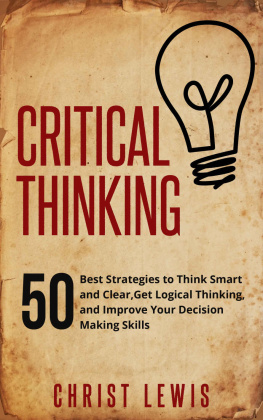PRAISE FOR ARGUING FOR OUR LIVES
At the moment, what passes for political debate is the bickering of two vociferous and wrong-headed parties. Robert Jensen reacquaints us with the political and social skills well need if were to reclaim politics for the 21st century. This is a brave book, one that packs more wisdom in its few pages than a shelfs worth of political theory, because its also a book about political practice. Jensen patiently, honestly, and rigorously exemplifies the highest virtues of a public intellectual. Raj Patel, author of Stuffed and Starved: Markets, Power and the Hidden Battle for the Worlds Food System
The first date or dinner party taboo is famous: No religion, no politics. Debating, discussion, engagement with ideas that matterthese are all supposed to be left to professionals, specialists who talk to each other in mutually incomprehensible ways. Meanwhile decades of advertising, sound bites, PR, filtered information, and internet trolling have numbed us even more. But we dont have to live this way. We could immediately start living in a better world, one in which every conversation was an opportunity to learn more about ourselves, others, and the precious little world we all have to try to live on together. To do that, though, we would have to re-learn how to think and talk, how to agree and disagree. Robert Jensens Arguing For Our Lives can help us do that. Justin Podur, author of Haitis New DictatorshipArguing for Our Lives is a crucial book for reclaiming not only the pedagogical and political virtues of critical thinking, but for securing the foundations for critical agency and engaged citizenship. This is an indispensable book for students, educators, and others willing to fight the current ongoing assault by religious, political, and moral fundamentalists on critical thought, if not reason itself, that has engulfed American politics. Everyone should read Arguing for Our Lives if they believe there is a connection between how we think and how we act, how we understand democracy and how we experience and struggle for it. Henry Giroux, author of Twilight of the Social: Resurgent Politics in the Age of Disposability and Disposable Youth
Arguing for Our Lives
A Users Guide to Constructive Dialog
Robert Jensen

City Lights Books | San Francisco
Copyright 2013 by Robert Jensen
All Rights Reserved.
Cover design: MILLER 360
Introductory quote by James Baldwin is from his essay As Much Truth As One Can Bear, in Randall Kenan, ed., The Cross of Redemption: Uncollected Writings (New York: Pantheon, 2010), p. 34.
Library of Congress Cataloging-in-Publication Data
Jensen, Robert, 1958 July 14
Arguing for our lives : a users guide to constructive dialog / Robert Jensen.
pages cm
ISBN 978-0-87286-573-0
1. Reasoning. 2. Thought and thinking. I. Title.
BC177.J46 2013
160dc23
2012049282
E-edition also available: 978-0-87286-605-8
City Lights Books are published at the City Lights Bookstore
261 Columbus Avenue, San Francisco, CA 94133
www.citylights.com
Not everything that is faced can be changed; but nothing can be changed until it is faced.
James Baldwin
Contents
INTRODUCTION
The Age of Anxiety
It would be tempting to say that we live today in the Age of Anxiety, if such an age hadnt already been proclaimed in the last century, first in Europe after World War I and then across the whole world in the nuclear age. Poet W.H. Auden won the 1948 Pulitzer Prize for his book The Age of Anxiety: A Baroque Eclogue, which struggledmostly unsuccessfullywith the search for hope in a modern industrial world drained of meaning:
Both professor and prophet depress,
For vision and longer view
Agree in predicting a day
Of convulsion and vast evil...
Auden didnt express a lot of confidence in his fellow citizens abilities to change course:
We would rather be ruined than changed,
We would rather die in our dread
Than climb the cross of the moment
And let our illusions die.
While the number of prescriptions that doctors in the United States today write for anxiety disorders might suggest our own moment in history is particularly anxious, we should step back and think of all of recorded human history as an anxious age. Ever since we humans created what we call civilization and started the project of living beyond the planets means and beyond our own capabilities, it has been inevitable that human societies would struggle with anxiety. The further we overreachcreating complex societies too big to manage, drawing down the ecological capital of Earththe more intense the collective anxiety. Our problem is not just the many anxious individuals who have particular trouble coping, but ways of living that arent designed for the type of animals that we are, as we try to micro-manage a world that is too vast and complex for us to control. Our collective anxiety is not an aberration but a predictable outcome of a simple truth:
For ten millennia, we have been a species out of context.
Lets put the anxiety of our age in this larger historical framework. The genus Homo goes back a couple of million years, and our species, Homo sapiens, has been around for about 200,000 years. What we call civilization, which arose with the invention of agriculture, starts only about 10,000 years ago. What today we take to be normal ways of organizing human societies are, in fact, recent developments, radically different from the way we lived for 95 percent of our evolutionary history. We evolved in small gatherer-hunter groups, band-level societies that were probably well under one hundred members and organized internally in much more egalitarian fashion than the way we live today.
When we create social, political, and economic systems that require us to deal with more people and more complex relationships in hierarchies, we are living outside of our evolutionary context. When individual humans are taken out of familiar settings and plopped down in brand-new places, we get a bit anxious. What is true for us as individuals is true at this larger level. Life out of context is bound to be an anxious life.
This out-of-context existence produces a baseline anxiety, from which we see spikes at particular moments in history when we humans seemed incapable of managing ourselves in any sort of rational and humane manner. In the twentieth century, we saw that happen after the mass slaughter of World War I, when the best and the brightest of Europe had just finished fighting a war that reached new levels of barbarism. After World War II, during which the barbarism returned in full force, humans were left to ponder the possiblitiy of complete annihilation in the nuclear age.
There is plenty of horror in the world todayboth in the intense, sporadic violence of war and in the ongoing, everyday suffering that results from global inequalitybut humans also have taken some steps forward in our dealings with each other. In relations within and between societies, there has been progress, albeit fitful and uneven. Slavery is illegal and has been abolished in practice in most places. In many societies there is recognition of the value of cultural diversity. Gender and racial equality have advanced in significant ways. There is much work to be done to produce a more just world, but one can see the path for moving forward.
But there is a good reason we may be in a distinctive age of anxiety, if we take seriously the more intractable problems on the ecological front, where the news is bad beyond the telling. Consider this warning from 1,700 of the worlds leading scientists:
Next page
